Artificial intelligence (AI) is undeniably one of the most demanding technologies across various industries with real estate being no exception. When it comes to integrating AI in real estate mobile apps, it works like a charm- why? In the past, real estate businesses used to operate manually to complete their routine tasks, such as listing properties, scheduling visits, estimating property values, offering customer support, and much more that can now be effectively done with the help of AI-powered real estate app solutions.
Real estate property owners can optimize their business processes with AI’s advanced automation capabilities, enhanced efficiency, and smart decision-making. But how do they achieve this, are there any challenges of implementing AI in real estate, and what are the current trends of AI in real estate app development? We’ll uncover answers to these questions in this blog, but before that, let’s explore AI's role in real estate.
Key Takeaways
- Artificial Intelligence plays a key role in the real estate sector by streamlining business operations, optimizing workflow processes, and automating mundane day-to-day activities to achieve maximum efficiency and productivity.
- AI in real estate enhances user experiences by providing personalized property recommendations and offering instant customer support through advanced AI chatbots and virtual assistants.
- AI helps simplify the property search process, automating the property valuation & estimation, forecasting future market trends, and enhancing the decision-making process.
- The selection of the right AI tools for real estate app development must be based on the unique business needs, requirements, and challenges.
- Addressing the common AI challenges in real estate apps, such as data and security concerns, technical issues, data biases, and more by implementing best practices is crucial for the effective implementation of the real estate app development process.
The Role of AI in Real Estate Mobile Apps
From streamlining business operations to personalizing customer experiences, AI in real estate mobile apps has emerged as a game-changer. As a real estate agent or an owner, you can tap into exploring current market trends, uncover hidden data patterns, get insight into buyers’ behavior and preferences, offer tailored property recommendations, forecast future property demands and fluctuating pricing models, and more with the help of AI-powered real estate apps. Data and predictive analytics, recommendation engines, smart property estimation, and advanced search filtering, are a few of the many AI features integrated into real estate apps that boost productivity and drive remarkable return-on-investment opportunities.
To learn more, let’s dive into exploring how artificial intelligence is revolutionizing the real estate industry and bringing digital transformation:
How AI Revolutionizing the Real Estate Business
AI goes beyond automating routine tasks, it extends its capabilities across various aspects of real estate to improve real estate property and data management. Let’s discuss them in detail:
1. Chatbots and Virtual Assistants
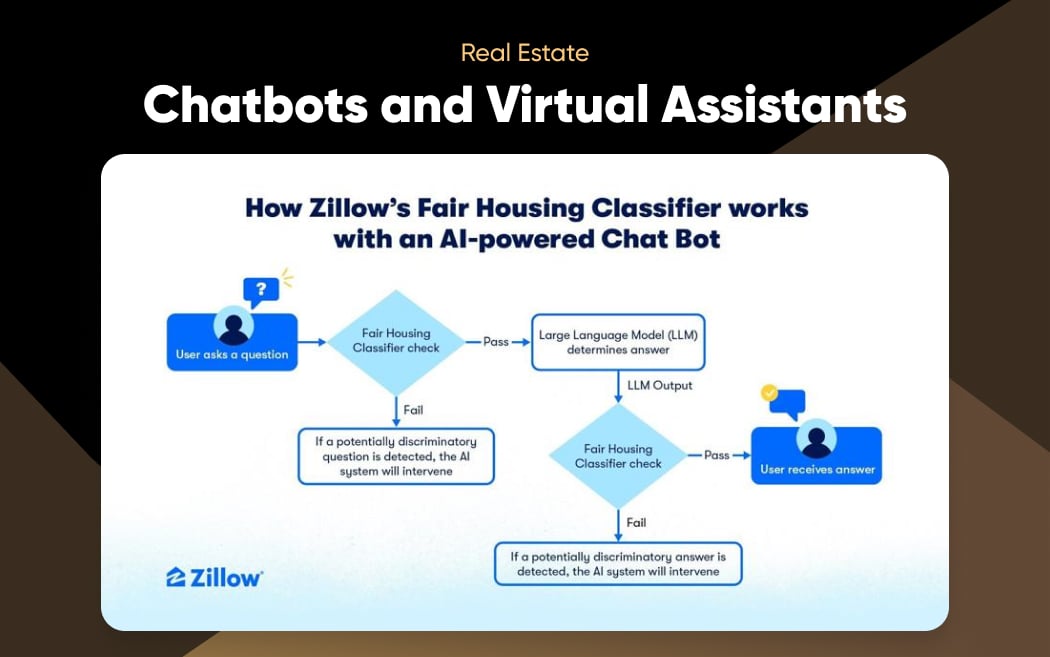
Offering round-the-clock customer service is no longer an exception it is a necessity. AI-powered chatbots are virtual assistants in real estate apps that offer 24/7 customer support with quick and instant responses to customer queries, which otherwise would have been quite difficult to manage by human agents themselves.
AI chatbots integrated with natural language processing and machine learning can comprehend user queries to provide real-time responses. Whether it be driving insights about a specific property or guiding users through the buying or renting process, AI chatbots work as virtual assistants providing real-time feedback and instant responses to customers. As a result, implementing AI chatbots in real estate apps drives engagement, improves overall customer satisfaction, and minimizes human intervention.
2. Personalized Property Recommendations

Today’s property seekers demand more personalized experiences to seamlessly discover lands and property recommendations tailored to their needs and preferences. AI search recommendation engine captures user browsing habits, patterns, behavior, and preferences to suggest properties based on their location preferences, amenities, and budget constraints to offer targeted suggestions, which ultimately increase conversion rates and deliver a more satisfying property search experience.
With advanced search filtering and recommendation, it becomes more than easier for realtors to identify user preferences and recommend properties based on the user choices that they may be willing to purchase.
3. Automated Property Valuation and Estimation
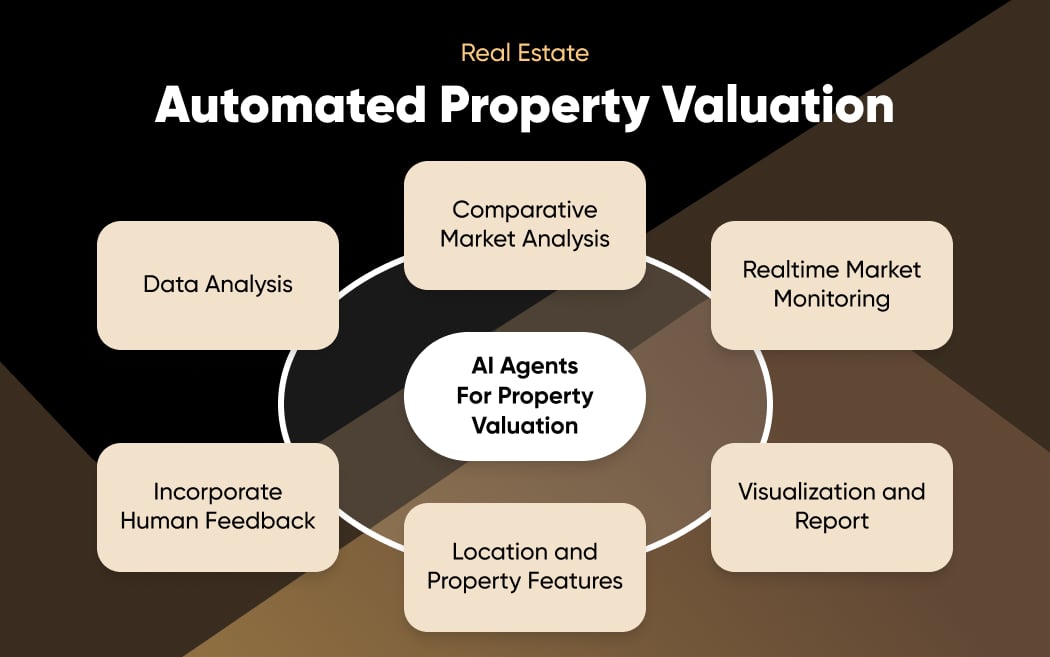
AI data analytics determines the estimated value of a property by analyzing various factors, including property location, size, amenities, and market conditions. Automated Valuation Models (AVMs) are AI-driven tools that estimate property values by analyzing vast amounts of data, including recent sales, property characteristics, and market trends. These models provide real-time, data-driven insights into property value, which eliminates the need for manual valuation methods.
This also ensures realtors price their property competitively after evaluating different characteristics of the property, which eventually helps in closing deals faster.
4. Property Forecasting with Predictive Analytics
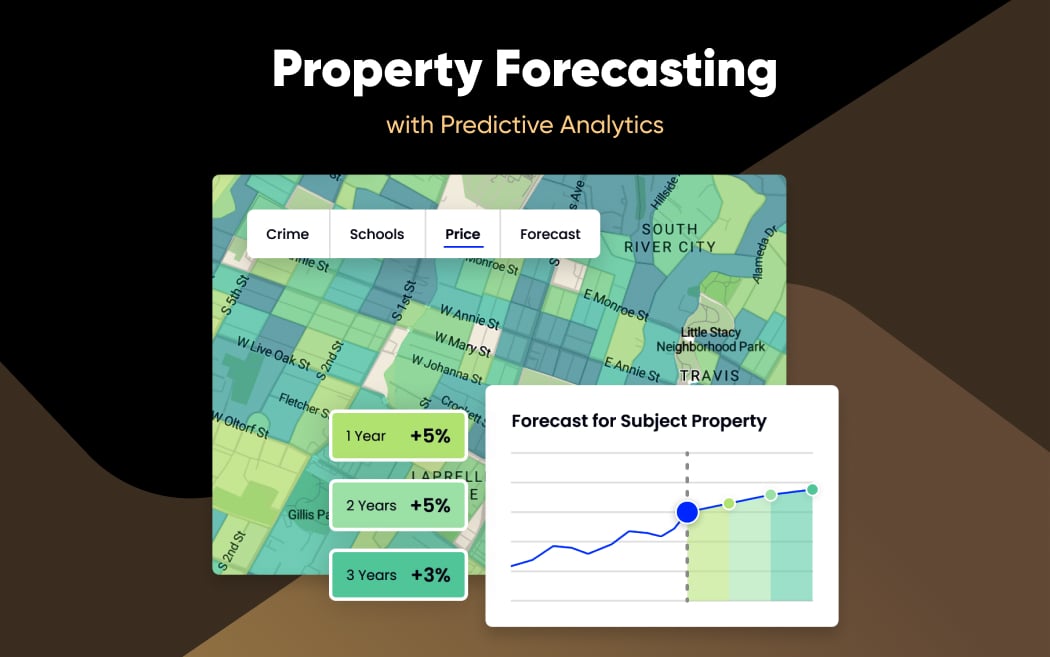
The real estate market keeps fluctuating in terms of property prices, market demands, values, trends, and more. However, it’s necessary to predict future property trends, events, and outcomes through AI’s predictive analytics in the development of real estate mobile apps. Predictive analytics is the field of AI that uses current and historical data patterns to help forecast what’s likely to happen in the future based on the data of what has already happened in the past.
Realtors can use predictive analytics to forecast future property market trends, anticipate changes in property values, and also predict buyers' behavior to tailor the offerings and suggestions accordingly.
5. Comprehensive Data Analysis
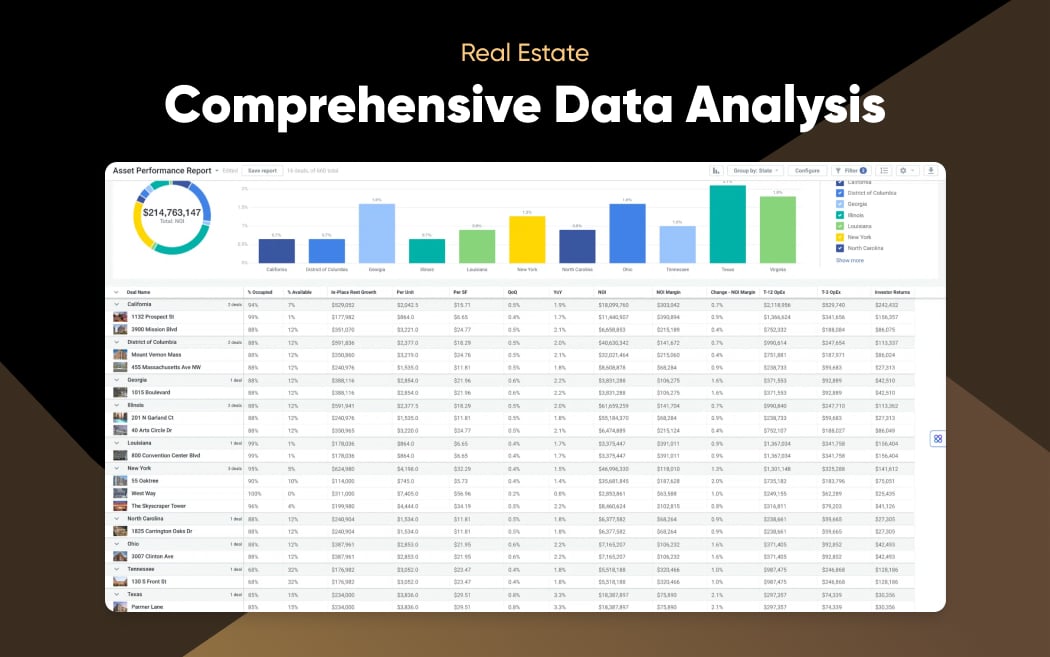
AI analytics in real estate apps enables real estate agents to get a deep understanding of their user behavior, pain points, and preferences by processing extensive data from various sources. AI tools analyze user interactions, property searches, demographic information, and feedback to identify patterns and trends. This insight helps realtors tailor their services and app features to meet user needs effectively.
Additionally, AI-driven research can segment users based on their preferences, enhancing personalized marketing strategies and improving user engagement. Furthermore, AI analytics empowers real estate businesses to optimize user experience, predict market demands, and stay competitive by making informed data-driven decisions.
6. Virtual Reality (VR) with AI

Integrating virtual reality with AI in real estate offers immersive property viewing experiences. It allows users to virtually walk through spaces, explore details, and visualize the potential of a property. The AI enhances VR experiences by generating realistic, interactive virtual tours that adapt to user preferences and behaviors.
Prospective buyers can explore properties remotely, with AI providing tailored recommendations for each user based on their preferences. This combination reduces the need for physical visits, saving time and resources. Additionally, AI-driven analytics within VR can track user interactions that enable realtors to gain valuable insights into customer preferences. Together, VR and AI create immersive, efficient, and personalized real estate experiences for higher customer satisfaction.
How to Choose the Right AI Tool for Your Real Estate App
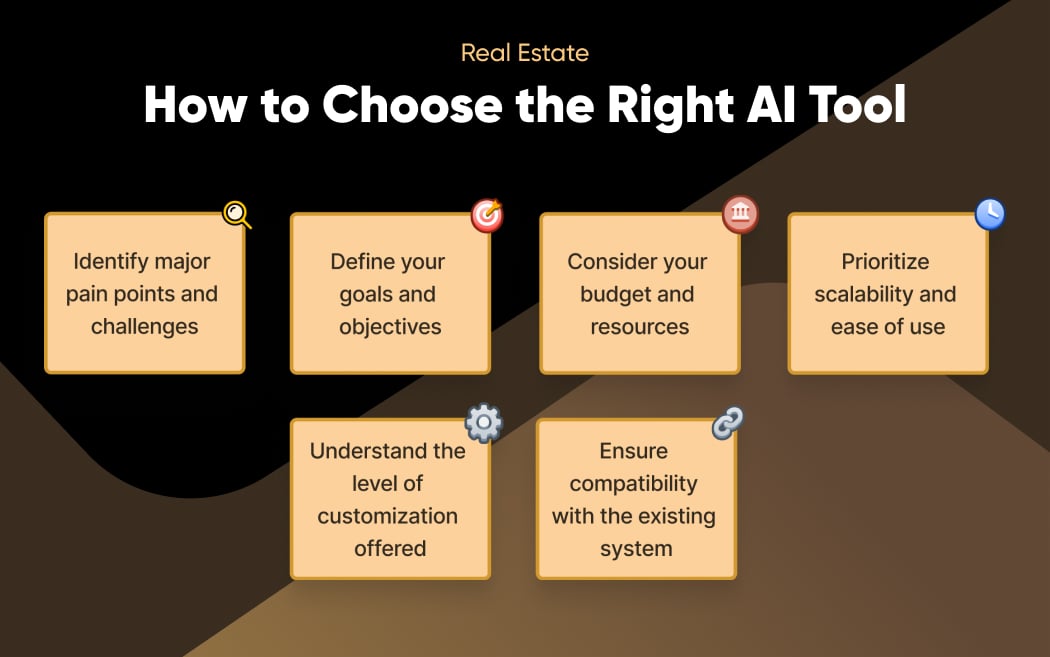
Before you proceed to select an AI tool for your real estate app development, it’s crucial to evaluate your specific business needs and requirements. To achieve this, you must consider the following factors that help you select the right AI tool that aligns with your business needs.
- Identify major pain points and challenges: Determine the exact issues your business currently encounters. Are you dealing with inaccurate property valuations, slow response times to user queries, or inefficient data management? Knowing your pain points will help you find an AI tool tailored to these specific challenges.
- Define your goals and objectives: The first step is to identify the goals of integrating AI into your real estate app. Specify what you want to achieve with the AI tool. This could include streamlining operations personalizing user experiences, boosting sales, or increasing customer satisfaction. Considering your business goals will help you select the right AI tool that complements your business needs.
- Consider your budget and resources: Determine how much you can invest in an AI tool as the budget of each tool may vary from others. Additionally, consider upfront costs and ongoing expenses required for maintenance and updates. Assess whether your team has enough expertise and technical knowledge to implement and integrate AI tools in your real estate app effectively.
- Prioritize scalability and ease of use: Choose an AI tool that can scale with your real estate app as it grows. It should handle increasing data volumes and more complex tasks as your user base expands. Most importantly, consider the tool, which is user-friendly with a simple interface, clear navigation, and comprehensive training resources to smoothen the development process.
- Understand the level of customization offered: Look for AI tools that offer customization to fit your app's specific needs. This might include customizable user interfaces or flexible features. The more adaptable the tool, the better it will align with your unique app requirements and workflows.
- Ensure compatibility with the existing system: Verify that the AI tool can seamlessly integrate with your existing software and platforms, such as your property database, CRM, and user management systems. The tool should complement your current systems without causing significant downtime or requiring extensive modifications.
AI implementation into your real estate app isn’t about choosing an expensive or fancy AI tool, instead, it's about carefully selecting the tool that aligns with your specific business goals, needs, and challenges. Therefore, you must consider the above factors and then proceed toward the selection of the right AI tool to ensure the success of your real estate app development.
Best Practices to Overcome Challenges of AI in Real Estate
While AI offers tremendous benefits, there are certain challenges that come along with its integration into real estate applications. Below, we’ve outlined some of the best practices to overcome the challenges of AI in real estate app development.
1. Data Privacy and Security Concerns
As AI heavily relies on data, protecting your client’s sensitive data and information is crucial. Here’s how you can address this challenge effectively.
- Implement Robust encryption methods: Implementing robust encryption methods, secure authentication processes, and constant monitoring helps you prevent potential data breaches and unauthorized access.
- Adhere to Data Compliance Regulation: Compliance with data protection regulations, such as GDPR or CCPA, is mandatory to avoid legal repercussions and maintain user trust.
- Ensure Transparency: Provide clear transparency about how you collect, store, and retrieve your client's data. Obtain their explicit consent for data collection and processing and also communicate your data collection privacy policies.
2. Issues Integrating with Existing Systems
You might face compatibility issues when integrating AI with your existing systems. Eventually, compatibility issues can arise if the AI tool doesn't seamlessly integrate with your current property databases, CRM, or user management systems.
- Identify Potential Compatibility Issues: Determine areas where conflicts or compatibility issues may arise with the new AI tool, such as your existing property databases, CRM, user management systems, and other relevant software.
- Thoroughly Test the System Compatibility: Ensure seamless integration by thorough testing and potentially customizing the AI tool to fit your specific business needs.
- Utilize APIs and Middleware: Use APIs to facilitate communication between the AI tool and your existing systems. Implement middleware to bridge gaps between incompatible systems, ensuring smooth data exchange.
3. Technical Issues or Malfunctioning
AI tools are designed proficiently but sometimes may malfunction due to technical issues and glitches that could ultimately affect your real estate app development process. For this purpose, it's essential to prepare a contingency plan in case the system malfunctions or some technical issue arises unexpectedly. Here’s how you can do so:
- Conduct Pre-Deployment Testing: Conduct extensive testing in a controlled environment before deploying the AI tool. Also, test the AI tool under various conditions and use cases to identify potential issues.
- Look for Technical Support: Select AI vendors who are experienced enough to tackle issues promptly and offer round-the-clock technical support. Ensure the vendor also provides useful resources for troubleshooting issues that can be done from your end easily.
- Implement Data Backup Plans: Technical failure or glitches may contribute to the loss of important data. Nonetheless, you can overcome this challenge by backing up your data and preparing a recovery plan to quickly restore operations in case of disruptions. Or you can store your data over the cloud servers for secure data storage and prevent data loss.
- Ensure Regular Updates and Maintenance: To ensure the smooth functioning of your app, conduct regular testing, updates, and maintenance. This approach helps to keep the app up-to-date with the latest features, fix bugs, and overcome performance issues.
4. Data Biasness & Ethical Concerns
AI algorithms can inadvertently introduce biases in data leading to inaccurate property valuations. It is crucial to design and train AI systems to be as unbiased as possible and regularly audit them for fairness. Follow the best practices to proactively address ethical concerns and ensure fair and unbiased decision-making.
- Ensure Transparency and Explainability: Clearly explain how the AI tool makes decisions, especially when it impacts users significantly (e.g., property valuations, and loan approvals). Provide easily understandable explanations of AI decisions, enabling users to grasp the logic behind them.
- Mitigate Bias in AI Algorithms: Use diverse datasets to train AI algorithms to reduce the risk of bias. Conduct regular audits of AI models to identify and correct any biases that may arise.
- Promote Accountability and Ethical Use of AI: Establish and follow clear ethical guidelines for AI development and deployment. Take accountability for the outcomes achieved through your AI tools and if any error occurs, address them promptly. Evaluate the performance of your AI tool to ensure it aligns with ethical best practices.
Conclusion
AI is a game-changer in the field of real estate as it boosts business operations by automating manual property search and buying processes. The real estate market is constantly evolving with the latest AI trends that comprise chatbots, personalization, AI predictive and data analysis, virtual reality, etc. for elevating the user experience of buyers, sellers, and property dealers who strive to explore their dream homes using the mobile apps equipped with the most-demanding artificial intelligence technology. However, it's equally important to select the right AI tool and also overcome the challenges of AI in real estate by implementing the best practices discussed in this article.











